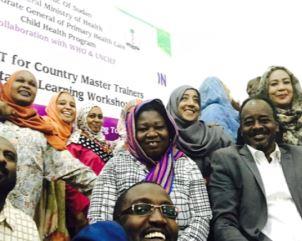 ICATT is an innovative software application to support the implementation of the WHO/UNICEF strategy on the Integrated Management of Childhood Illness (IMCI). The tool provides the possibility to adapt the generic IMCI guidelines at national and sub-national levels, and to develop ICATT-based training courses that fit into various training approaches1 June 2017 – For the first time in the Region, a total of 25 IMCI facilitators were trained on IMCI Computerized Adaptation and Training Tool (ICATT). The training of trainers took place in Khartoum, Sudan, from 16 to 20 April 2017, preceded by an adaptation workshop to develop the Sudan ICATT training course from 9 to 15 April 2017.
ICATT is an innovative software application to support the implementation of the WHO/UNICEF strategy on the Integrated Management of Childhood Illness (IMCI). The tool provides the possibility to adapt the generic IMCI guidelines at national and sub-national levels, and to develop ICATT-based training courses that fit into various training approaches1 June 2017 – For the first time in the Region, a total of 25 IMCI facilitators were trained on IMCI Computerized Adaptation and Training Tool (ICATT). The training of trainers took place in Khartoum, Sudan, from 16 to 20 April 2017, preceded by an adaptation workshop to develop the Sudan ICATT training course from 9 to 15 April 2017.
Background
Integrated Management of Child Illness (IMCI) is a key strategy adopted in Sudan to reduce the under-5 mortality rate. However, scaling up the initiative faces numerous challenges, including high turnover of care providers, the long duration and high costs of training courses, frequent updates of the guidelines and an unsatisfactory pre-service component of the training.
The IMCI ICATT was developed to address challenges such as these. The ICATT is a relatively new, innovative computerized software application that provides an opportunity for easy adaptation of the most updated generic guidelines at national and subnational levels. ICATT can be translated into various languages and used in a range of environments and settings with the potential to significantly increase training coverage as it allows computer-, Internet- and satellite-based facilitation that will be useful for in-service/pre-service training and distance learning programmes. The demand for more rapid scaling up of IMCI and greater utilization of new technology makes the introduction of ICATT to the Region crucial to respond to the needs of Member States.
In August 2016, an introductory regional capacity-building course was conducted in Khartoum to support countries with a high burden of child mortality and countries that need to sustain high coverage to explore various options for IMCI training and to strengthen their national teams by creating a core of resource persons and trainers. The Sudan team actively participated in this workshop and comprised participants from the Ministry of Health, universities, aAcademies of health sciences, UNICEF and WHO.
Sudan adaptation workshop
In order to take forward the recommendations of the regional workshop, the Federal Ministry of Health of Sudan, in collaboration with WHO and UNICEF, conducted an adaptation workshop followed by a national training of trainers for master trainers from federal and states ministries of health, as well as from universities implementing IMCI as pre-service training.
By the end of the adaptation workshop:
- a chart booklet was finalized
- Sudan ICATT training had been installed on computers in the Ministry of Health through DVDs and USBs
- national ICATT resources were identified.
All participants were trained in ICATT facilitation techniques – using individual computers, LCD projected mode and distance learning, and using national training course resources.
Recommendations
Recommendations arising from the meeting were for the Federal Ministry of Health of Sudan to scale up ICATT implementation in the remaining medical schools and pre-service institutes; the development of an Arabic version of ICATT with Sudan's experiencing serving as a resource for other Arabic-speaking countries; the adoption of a flexible approach for ICATT implementation based on the contexts of different institutes; and for WHO and UNICE to continue supporting this initiative in 2018–2019 national plans of action.
Related link
Integrated Management of Childhood Illness computerized training tool








